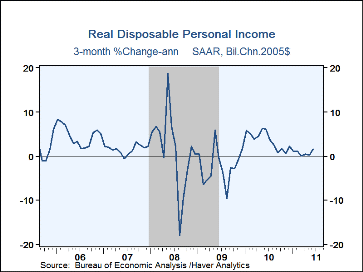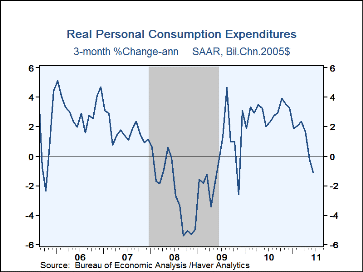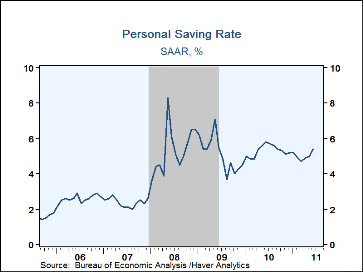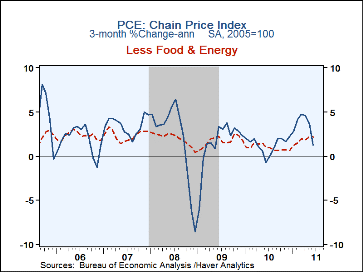 Global| Aug 02 2011
Global| Aug 02 2011U.S. Personal Income Increases But Spending Declines
by:Tom Moeller
|in:Economy in Brief
Summary
Personal income rose 0.1% last month following a revised 0.2% May increase, initially reported as 0.3%. A 0.2% June increase had been expected. The revision was part of the benchmark changes to the GDP accounts reflected in Friday's [...]
Personal income rose 0.1% last month following a revised 0.2% May increase, initially reported as 0.3%. A 0.2% June increase had been expected. The revision was part of the benchmark changes to the GDP accounts reflected in Friday's figures. The revision to personal income raised growth moderately for 2010 but lowered it sharply in 2009. Disposable income gained 0.1% following an unrevised 0.2% May gain. Adjusted for prices, however, growth was stronger due to lower gasoline costs. Constant dollar take-home pay rose 0.3%. The increase followed five consecutive months when real income was essentially unchanged. These latest changes pulled y/y growth in real income down to 1.1%, its worst since the period following the 2010 federal income tax cut.
Wages & salaries were roughly unchanged last month after a modest May 0.2% rise. The latest again reflected the negligible increase in payroll employment. A 0.3% decline (+13.1% y/y) in rental income was the third consecutive monthly drop, while proprietors' income slipped 0.1% (+6.9% y/y). Transfer payments rose 0.4%. The y/y increase eased to an upwardly revised 4.3% and contrasts with 13.8% growth in 2009 as the job market improved. Economic growth also raised June dividend income by 0.9% (9.9% y/y) following last year's 19.9% jump. Higher interest rates raised interest income by 0.5% (0.8% y/y) for the third consecutive month. That followed a 9.5% decline last year and a 19.8% drop in 2009. The personal savings rate rose to 5.4% with the divergent monthly changes in income & outlays.
Personal consumption expenditures fell 0.2% last month after a little-revised 0.1% May uptick. A 0.1% June uptick had been expected. Spending on durable goods fell 0.4% (+6.7% y/y) as auto sales fell for the third month in the last four. Lower gasoline prices dropped spending on nondurables by 0.6% (+9.1%). Services spending slipped marginally (+2.6% y/y). In constant dollars, real personal consumption expenditures slipped for the third consecutive month. On a three month basis spending fell 1.1% (AR).
The PCE chain price index fell 0.2% last month (+2.6% y/y) with lower gasoline prices. The core PCE price deflator inched up 0.1% and by 1.3% y/y. That's versus the record low year-to-year change of 0.7% reached this past December.
The personal income & consumption figures are available in Haver's USECON and USNA databases. The expectations figures are in the AS1REPNA database.
| Personal Income & Outlays (%) | Jun | May | Apr | Y/Y | 2010 | 2009 | 2008 |
|---|---|---|---|---|---|---|---|
| Personal Income | 0.1 | 0.2 | 0.4 | 5.0 | 3.7 | -4.3 | 4.6 |
| Wages & Salaries | -0.0 | 0.2 | 0.4 | 3.4 | 2.2 | -4.3 | 2.0 |
| Disposable Personal Income | 0.1 | 0.2 | 0.4 | 3.7 | 3.6 | -2.1 | 5.8 |
| Personal Consumption Expenditures | -0.2 | 0.1 | 0.2 | 4.4 | 3.8 | -1.7 | 2.7 |
| Saving Rate | 5.4 | 5.0 | 4.9 | 5.8 (Jun'10) |
5.3 | 5.1 | 5.4 |
| PCE Chain Price Index | -0.2 | 0.2 | 0.3 | 2.6 | 1.8 | 0.2 | 3.3 |
| Less Food & Energy | 0.1 | 0.2 | 0.2 | 1.3 | 1.4 | 1.6 | 2.3 |
| Real Disposable Income | 0.3 | -0.0 | 0.1 | 1.1 | 1.8 | -2.3 | 2.4 |
| Real Personal Consumption Expenditures | -0.0 | -0.1 | -0.1 | 1.8 | 2.0 | -1.9 | -0.6 |
Tom Moeller
AuthorMore in Author Profile »Prior to joining Haver Analytics in 2000, Mr. Moeller worked as the Economist at Chancellor Capital Management from 1985 to 1999. There, he developed comprehensive economic forecasts and interpreted economic data for equity and fixed income portfolio managers. Also at Chancellor, Mr. Moeller worked as an equity analyst and was responsible for researching and rating companies in the economically sensitive automobile and housing industries for investment in Chancellor’s equity portfolio. Prior to joining Chancellor, Mr. Moeller was an Economist at Citibank from 1979 to 1984. He also analyzed pricing behavior in the metals industry for the Council on Wage and Price Stability in Washington, D.C. In 1999, Mr. Moeller received the award for most accurate forecast from the Forecasters' Club of New York. From 1990 to 1992 he was President of the New York Association for Business Economists. Mr. Moeller earned an M.B.A. in Finance from Fordham University, where he graduated in 1987. He holds a Bachelor of Arts in Economics from George Washington University.
More Economy in Brief
 Global| Feb 05 2026
Global| Feb 05 2026Charts of the Week: Balanced Policy, Resilient Data and AI Narratives
by:Andrew Cates










